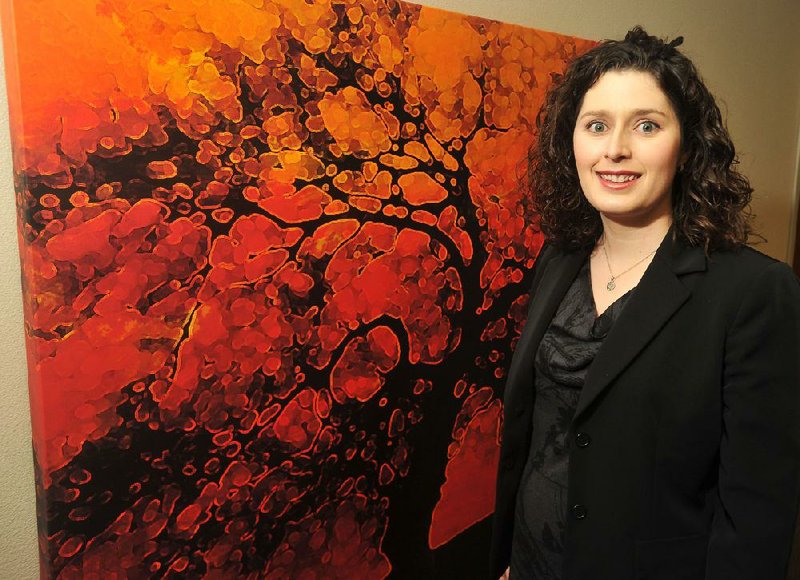FAYETTEVILLE -- It might be hard to imagine, but the chance of domestic violence occurring in any neighborhood is anything but rare.
"That's something that I didn't understand," says Sarah Langham, a member of the Peace at Home Family Shelter board of directors. "It really is every walk of life and [domestic violence] happens to people that you would not expect to be in that situation."
Langham says the statistics clearly show that domestic violence can happen to anybody, regardless of income, background or any other factor.
"In relationships, it is cross cultural, cross economic status where the abuser makes an intentional effort to isolate the victim," she says. "They remove friends, family, resources and make it to where it doesn't matter how educated they are or how good their job is.
"They feel powerless."
Peace at Home Family Shelter provides a haven for those escaping domestic violence, as well as a crisis hot line and support groups. The shelter staff also helps survivors of domestic violence gain independence from their abusers.
In 2014, the shelter helped more than 6,125 women and children escape bad home lives and provided a variety of resources to ensure that they won't have to return.
"There are times that people do return [to their abuser], but for the women who get to come and stay in the shelter, that's a very intensive period of time," Langham says. "The hope is that their success rate of living independently is going to be higher than some of the other programs that are out there."
In the past month, not a single one of the 16 women who left the shelter returned to their abuser. Instead, half of them are living independently and the other half are living with a family member, friend or in a different shelter.
Peace at Home provides a combination of services to help survivors discern what sort of life she would like for herself and her children, and a develop a plan for how to get there.
"We want to have an empowerment model," Langham says. "We ask them what their goals are, and obviously we hope that one of their goals is to live free from violence, but working on the empowerment model, hopefully [yields] better results for women to live independently and violence-free."
Though it has a relatively small team, with a staff of fewer than 20 people and a 15 person board of directors, Peace at Home relies on their passion and dedication to provide safe homes, food and clothing, legal counsel, and a number of classes on site until families can establish a safe home.
"Our advocates meet with survivors to come up with a plan for where they're at, what their goals are and which services we can provide directly," Langham says.
Given that survivors can come from such a wide variety of homes and circumstances, that process rarely, if ever, looks the same.
"Every story is different," she says. "There are certain warning signs [of abuse], red flags and classic things that they see, but everyone's so unique and there are so many complicating factors.
"They wade through all that to meet the person where they are and help them achieve their goals."
Some of those complicating factors are the abuse of drugs and alcohol or mental-health problems, or the effect leaving home will have on children or a partner's reputation.
Peace at Home regularly partners with other organizations to more successfully meet clients' needs. Many times the combined effort has the desired result, but in cases where it doesn't, staff and board members say it's their place to continue to be a stand-by for the survivor.
"If someone decides they want to return to their abuser, we won't say 'OK, no more services from us, that's an unacceptable outcome,'" Langham says. "Shelter success stories are inspiring to hear what our survivors have been able to accomplish, sometimes in a really short time, for themselves and their children."
In October and November, Peace at Home received 125 crisis calls, took on 64 new nonresidential clients and served 53 residential clients.
That's a big responsibility for an organization with a small staff and small budget.
Langham uses her expertise as a certified public accountant to make sure the finance committee can stretch each dollar to maximum impact.
On occasion, there are financial issues beyond her control.
"When the government sequester froze some of our fundings for a period of time, [you realize] that this is a life or death thing for some people," Langham says. "If we didn't have the shelter, there are people who would be harmed, and some who have been harmed but it would have been worse if they hadn't escaped [from their abusers]."
Langham signed on for another three-year contract with the board because she is confident that the Peace at Home empowerment model is contributing to ending violence.
"We help our clients because sometimes, it seems like the hurdles are so big, if they don't know what resources are there and if they haven't connected with them, it can seem like they're in a hopeless situation, when really there's hope, and there's help," she says.
Victims of violence can find assistance at the Peace at Home hot line, (479) 442-9811. For more information on the shelter and its outreach services, visit peaceathomeshelter.org or call (479) 444-8310.
NW Profiles on 01/04/2015

